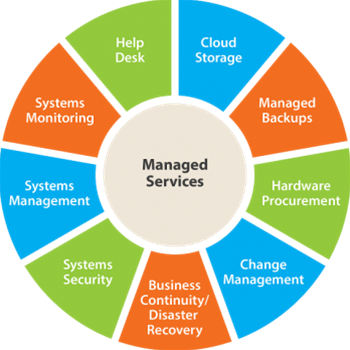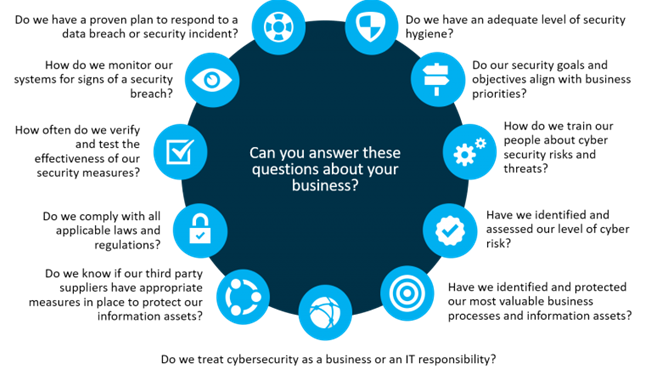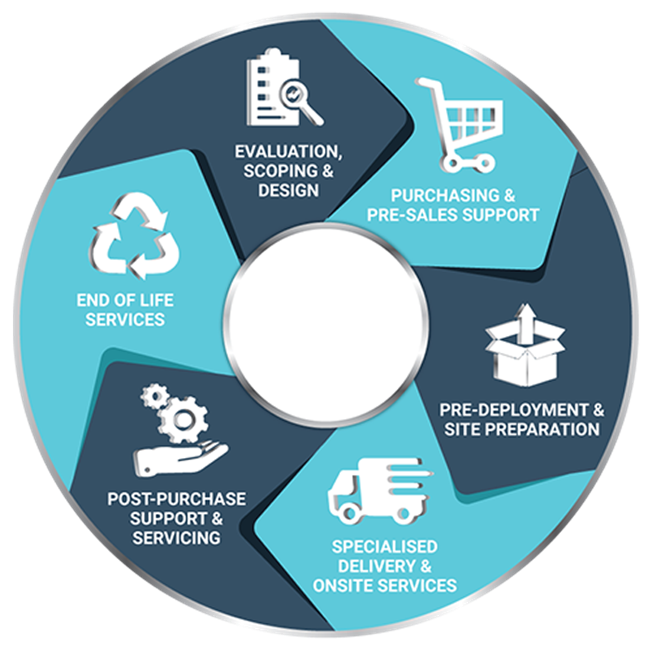Most focus will be on funding, recruiting, marketing and the excitement of building something new. Other, more-mature companies may have started off using their own equipment and added to it over time but have now left themselves with an unwieldy mess of semi-compatible, technology products. More-thoughtful companies may have made a big investment in the latest infrastructure only to find that it all needs replacing just a few year's later and they need to address another huge capital expense all over again (the C-Suite hates this). The solution to all of these issues (and more) is to embrace Managed IT Services.

GKM2
What are Managed IT Services?
Managed IT services are those provided by outsourced, third-party companies who install, manage and maintain an organisation’s technology infrastructure. They include the leasing, set-up, maintenance and support of computers, networks, storage and security operations. Financially it involves a move from CapEx to an OpEx payment model.
What are the main benefits of Managed IT Services?
There are many benefits for companies of all sizes to embrace managed IT services but some of the most important concern the following:
1. Moving from CapEx to OpEx
Few company directors like forking out huge sums of money on infrastructure but fewer still like having to do it all over again a few years later. Paying for managed IT services typically means technology is leased for set periods. This means workers' laptops automatically get refreshed every few years, servers and network infrastructure will be upgraded as needed and massive one-off payments become a thing of the past. Companies of all sizes appreciate the opportunity to spread technology payments over a year(s) rather than budget for one massive bill.
2. Outsourcing tech support
Modern managed IT service providers can remotely monitor your computers and other technology operations and identify potential problems before they manifest. They are available for remote support and can make on-site visits - all according to Service Level Agreements (SLAs) - on the occasions that they're required. For many companies, this is preferable to employing a full-time tech support professional who won't be required for much of the time. It also fends off having to pay for one-off, expensive call-outs in emergencies.
3. Software licensing benefits
Managing which software your employees use is a major minefield - it's very easy to fall-foul of improper licensing requirements and this can lead to major fines. Managed IT Service providers will audit all of the software that your users use so you don't need to worry about it. In many instances, the provider will be a certified partner of the software company, can set-up and support everything and offer preferential pricing to boot.
4. A single point of contact
Even if you're well-versed in setting up the technology in an office environment, the idea of maintaining subscriptions and updates with multiple vendors quickly becomes a headache. Your office software's licensing might require attention in once place, security another, productivity tools elsewhere, networking with another company altogether and hosting services spread around the internet. By using managed IT service providers everything can all be in one place (or siloed into a handful of specialist providers).
5. Hybrid cloud and off-site hosting
As nice as it would be to have all data and operations run in the cloud, many companies need to physically host their own data for reasons including security and compliance. Hosting your own server room causes all manner of issues: it can be expensive to set-up, the heat can upset your office's climate control and send it into (expensive) overdrive, the noise can upset workers and you need to take physical security of the equipment into account. The good news is that specialist, managed IT services companies allow you to hand-off this physical hosting to off-premises locations. They will house and maintain your equipment while providing a rapid connection to both it and (usually) other public and enterprise clouds.

Examples of providers of Managed IT Services
BDC Services - Based in North Sydney, BDC Services provides consultation, installation and maintenance for business-critical IT environments. It partners with leading vendors of business continuity solutions, critical infrastructure monitoring, cloud services, IT infrastructure, connectivity, power and cooling. Click here for more information.
GKM2 Solutions - GKM2 provides IT Managed Services to Sydney SMBs which are flexible, affordable and keep offices running productively and securely 24/7. More information is available, here.
CyberRisk - This Melbourne, Docklands-based company is security-focused and believes that effective cyber-risk management is more than just firewalls, log monitoring or the deploying of anti-virus software. It requires a holistic view of people, processes and products in order to architect a secure, resilient and effective organisation. For more information, click here.
Digital O2 - Queensland's Digital O2 offers managed IT services, cloud services, help desk, web hosting, web development and equipment procurement services. Click for more information.
Renew IT - This global company purchases ex-lease or aging IT assets and offers clients secure, certified data sanitisation. Its managed IT services stretch from asset deployment to asset disposal.
Dragonfly technologies - This Sydney company specialises in security and network managed services and automation.
Switch Connect - Based in Eight Mile Plains, Queensland, Switch Connect offers a broad spectrum of managed IT services including enterprise and retail app development.
Where can I discover news about Managed IT Services?
Recent Stories about Managed IT Services
Register for CRN's MSP Report
MSP First Focus aims beyond carbon neutrality
Kaseya CEO: ‘We’re not buying Datto to destroy it’
Pax8 says some 100 ANZ MSPs signed up to enablement platform
DC Two taps Perth MSP Attained Group to cross-sell IT services
Spirit jacks up prices as part of cost cutting measure











